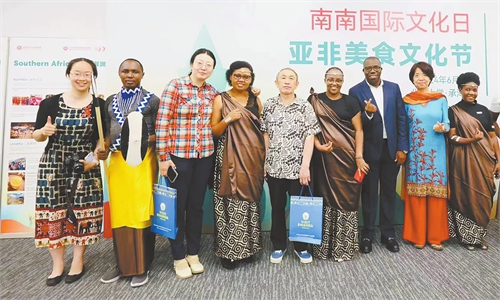China, Africa see greater potential for cooperation in agricultural sector: domestic, foreign experts
Deepened by tax reductions, green channels and expos

A volunteer grinds coffee beans with children during a hands-on experience session at the Ethiopia pavilion of a permanent exhibition hall of the China-Africa Economic and Trade Cooperation Promotion Innovation Demonstration Park in Changsha, central China's Hunan Province, Aug. 30, 2024. Various activities promoting youth communication between China and Africa were organized here during the summer vacation. With the help of African volunteers from local universities, Chinese students were able to feel the charm of African culture by learning traditional African dance, music, folk arts, and making immersive tours of African customs via VR devices. Photo: Xinhua
Chinese and African experts thought highly of the achievements in bilateral agricultural cooperation and expressed hopes for further exploring this potential, ahead of the 2024 Summit of the Forum on China-Africa Cooperation (FOCAC) scheduled to be held in Beijing from Wednesday to Friday.
At the upcoming forum, agricultural cooperation is expected to be a key focus of the agenda.
Thanks to relentless efforts by the Chinese side - such as tax reductions, green channels for trade and trade expos - agricultural development has been boosted in Africa, helping regional countries in poverty alleviation and hunger reduction, experts said.
Through mechanisms such as the FOCAC, China has provided African countries with channels to enter the Chinese market, which will drive Africa's industrial revolution, Dennis Munene Mwaniki, director of research and executive director of the China-Africa Centre at the Africa Policy Institute, told the Global Times.
Mwaniki cited examples of China's gradual implementation of tariff-free measures for more African products that promote economic diversification, industrialization and processing development in Africa.
Behind Africa's hope to expand agricultural exports to China is close China-Africa cooperation in the fields of agriculture and food security, Mwangi Wachira, former economist at the World Bank and advisor to the Government of Kenya, told the Global Times.
According to the UN Food and Agriculture Organization, nearly 20 percent of the population in Africa faces hunger, a much larger proportion compared with other regions in the world.
Addressing this urgent issue is the basis of all African development plans, Wachira said.
He said that in Kenya, there are Chinese-funded agricultural projects dedicated to improving the food production capacity which is of great significance to the local people.
The growth in China-Africa agricultural trade reflects the high level of complementarity between the two sides in this field, Song Wei, a professor at the School of International Relations and Diplomacy at Beijing Foreign Studies University, told the Global Times on Sunday.
Song said that China is expected to continue facilitating imports of high-quality African agricultural products by expanding the types of imported products and optimizing customs processes.
Additionally, China is likely to send more agricultural experts to Africa to help cultivate higher-quality products and increase investment in African agricultural processing, supporting local agricultural modernization, Song said.



